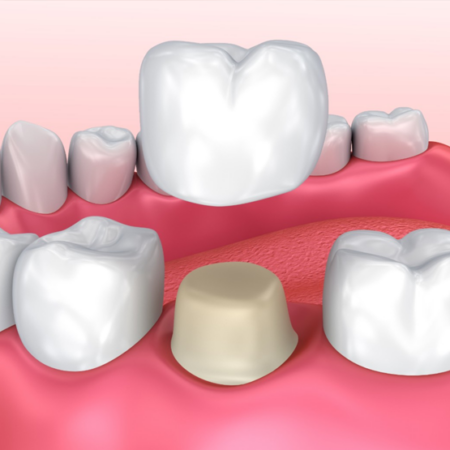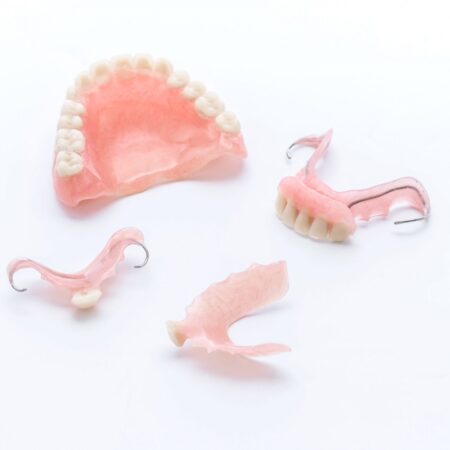
If you’d like to correct gaps between your teeth, chips, fractures, misshapen teeth or discoloration, composite bonding and porcelain veneers can help. An extremely durable type of veneer, porcelain veneers are thin shells of porcelain, bonded to the front surface of a tooth. Composite bonding is a process where composite resin is applied to a tooth and sculpted into shape. If you’re exploring your options, it can be useful to understand the differences between the two.
1. Tooth preparation
One of the key differences between composite bonding and porcelain veneers is the preparation involved. To prepare teeth for veneers, your dentist will usually need to remove a thin layer of tooth enamel (the outermost covering of a tooth). This helps the veneers fit over your natural smile. For composite bonding to be applied, your dentist will only need to roughen the tooth surface, so the resin can bond properly.
So, while bonding is minimally invasive, porcelain veneers are usually an irreversible procedure. This is important to bear in mind when choosing the best option for you.
2. Appearance
Both procedures offer natural-looking results. A precise shade of composite resin or porcelain is chosen to match your smile, or you can choose a lighter shade of porcelain for a whiter finish. Porcelain veneers also have light-reflecting properties, similar to your natural tooth enamel.
Composite bonding is usually used for minor cosmetic concerns, such as small chips or gaps. Whereas veneers cover the entire tooth surface.
3. Eligibility
Ultimately, your dentist will determine your suitability for either treatment, however you may be a good candidate if you meet the following criteria:
Veneers:
- You’re looking to correct concerns such as chipped, fractured or discoloured teeth
- Your teeth are moderately straight. If your teeth are severely misaligned, this can put too much pressure on veneers, causing them to crack
- You have healthy tooth enamel. Veneers are bonded to your tooth enamel, so it needs to be strong enough to support them
- Before undergoing treatment, you’ll need to be in good oral health
Composite bonding:
- You’re looking to correct minor cosmetic concerns, such as small gaps between your teeth, shorter teeth you’d like to build up, minor damage such as chips and fractures or misshapen teeth
- You have enough of the tooth intact for your dentist to build up from
- Before undergoing treatment, you’ll need to be in good oral health
- Your dentist will always carry out a thorough assessment before you have any treatment. One thing they may look out for in particular is teeth grinding, as it can cause damage to both treatments. If you think you may be suffering from grinding, let your dentist know during your initial consultation.
4. Cost
Composite bonding generally costs less than veneers, although the cost of each procedure depends completely on your individual needs. To find out the exact cost involved, you’ll need to have a consultation with a dentist who’ll assess your smile.
5. Durability
Porcelain veneers are generally more durable than composite bonds, however, both can last for many years with proper aftercare. If damage does occur, bonds can easily be repaired, while cracked veneers will need to be replaced.
6. Maintenance
Veneers and composite bonding require similar care to ensure they last as long as possible. To maintain both treatments, you’ll need to:
- Limit or avoid foods and drinks that stain your teeth, such as coffee, tea and wine. Porcelain veneers are more stain resistant than composite bonding, but both are liable to discolouration
- Wear a mouthguard if you take part in any contact sports, as impact could cause damage to the treatment
- If you suspect you grind your teeth, speak to your dentist who may advise wearing a mouth guard at night
- Avoid biting on objects that may chip the material, such as pen lids
- Brush your teeth twice a day and floss daily. If you have veneers, your gums and the tooth underneath are still subject to gum disease and tooth decay, so it’s important to continue a good oral care routine. For advice on caring for veneers, speak to your dentist who can provide further guidance
- Arrange regular check-ups and hygiene appointments to maintain good oral health and spot any issues early on
7. Length of treatment
Composite bonding is a fast solution and can usually be completed in one appointment. Porcelain veneers are custom-made to fit your mouth, so it takes at least two visits to have them fitted. Find out the treatment stages involved in fitting composite bonds and porcelain veneers.












